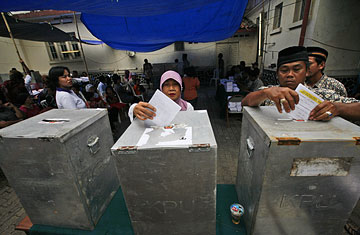
Indonesians cast their ballots at a polling station in Jakarta, Indonesia, on April 9, 2009
After more than 100 million Indonesians went to the polls on April 9, the party of President Susilo Bambang Yudhoyono looks set to take more seats than any other party in Indonesia's parliament. Early tallies show the Democratic Party taking 20.4% of the vote — nearly three times more than when the party made its parliamentary debut in 2004, making the president the candidate to beat in the upcoming elections. "This shows how strong Yudhoyono is," says Bara Hasibuan, a political columnist in Jakarta. "He is definitely in the commanding position."
The Democratic Party, which currently holds 57 of the 560 seats in parliament, ran again this year on its nationalist, secular, and pro-business platform. If the party's votes from Thursday translate into at least 20% of the seats in parliament, President Yudhoyono will find himself in the enviable position of being able to choose a running mate with less concern for coalition building. "The electorate has clearly moved farther away from the right-wing base," states Kevin Evans, an expert in Indonesia's political history and founder of the pemilu.asia website. The presidential vote is scheduled to take place in July and, if no candidate takes a majority, a run-off of the top two candidates will take place in September. (See pictures of a deadly dam burst near Jakarta.)
Though results will not be made official until May 9, several national surveys showed similar numbers, all indicating a rise of the Democratic Party and the slow demise of the Golkar Party and the Indonesian Democratic Party of Struggle (PDIP), both of which came of age during Suharto's New Order regime. The Golkar party, the former president's political vehicle, dropped from garnering 21.6% of the national vote in 2004 to just 14.5% today, while the PDIP, led by former President Megawati Sukarnoputri, slipped from 18.5% to 14.2%.
The estimated combined total of around 15% of the vote taken by Muslim parties is a historical low — it was over more than double that just five years ago. Rising to the fourth position was the Prosperous Justice Party, or PKS, the only Muslim-oriented party to make a strong showing, however slight — the party took 7.7% compared to 7.3% in 2004. Two smaller Muslim parties in the current parliament failed to even reach the threshold of 2.5% of the national vote. "Clearly, the people are not looking for parties based on religion," suggests Masdar Hilmy, a lecturer at the State Islamic University in Surabaya. "What they want is a party and candidate who listens to their concerns and has proven that they can realize their aspirations."
With secular and nationalist parties, like the newly established Greater Indonesia Movement Party and the party of retired Suharto-era General Wiranto, taking the majority of the votes, Indonesian voters appear to be moving toward the center and abandoning parties based on religion, observers say. Grappling with the global economic crisis and considerable challenges at home, a majority of Indonesians have once again shown that they do not want religion leading the national agenda. "Voters have become more pragmatic and rational as opposed to ideological," says Hasibuan.
Secular parties appeared to do well even in provinces like Aceh, the only part of the country to have enacted syariah law. Fears in the run-up to the election of violence in the once separatist-minded province failed to materialize although at least five were killed on the opposite end of the country in Papua on election day. Voters in the easternmost province, where separatist sentiment also runs high, went to the polls despite the violence that included attacks on a police station and the burning of a building. "We're seeing the Indonesian voter demonstrating that it is a rational voter, shunning sectarian issues," says Robin Bush, country representative for the Asia Foundation. "This election was a clear statement that they want progress."
